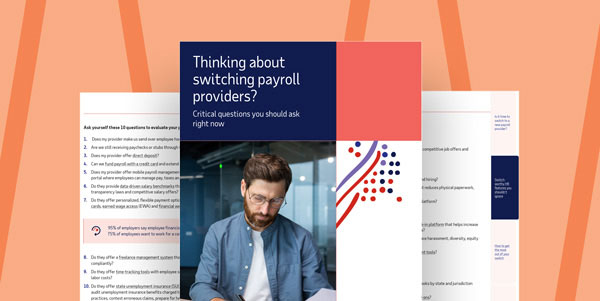During payroll processing, employers incur expenses, such as taxes and employee compensation. Until paid, these expenditures are known as payroll liabilities. They’re an essential part of a business’s budget and must be properly accounted for each pay period.
Table of Contents
What are payroll liabilities?
Payroll liabilities are amounts owed by an employer to employees, government agencies, insurance carriers and other entities as a result of processing payroll. These expenses must be paid by a specified date. Depending on when a company processes payroll and the pay date, it’s usually only a matter of days or weeks before payments are due. Certain employment tax deposits may even be due the next day.
Types of payroll liabilities
Payroll liabilities may be withheld from employee wages or paid solely by the employer. Specific examples include:
- Employee compensation
In addition to paying wages for services performed by employees, employers may pay other types of compensation, like bonuses and commissions. - Accrued paid time off (PTO)
In certain states, employers may be required to pay employees for their accrued PTO when they leave the company. - Employment taxes
Employers must deposit and report certain employment taxes they withhold from employees’ wages. They must also pay their share of these taxes where applicable. - Income taxes
Employers are generally required to withhold federal income tax from their employees’ pay. Many states and local jurisdictions also charge income tax. - Federal Insurance Contribution Act (FICA) taxes
FICA taxes, or Social Security and Medicare taxes, are a shared payroll liability. Employers pay their portion of the taxes and withhold an equal amount from their employees’ wages. In certain circumstances, employers also must withhold Additional Medicare Tax, but do not have to match it. - Unemployment taxes
Employers pay federal and state unemployment taxes. They do not withhold federal unemployment tax from employee wages, and in most cases, they do not withhold state unemployment tax either. Employers should check if their state requires employees to contribute to state unemployment, disability and family leave insurance programs via payroll deductions. - Employer-sponsored benefits
Depending on the benefit plan, employers deduct insurance premiums from employee wages on either a pretax or post-tax basis. They may also pay a portion of the premiums themselves, and if they offer retirement savings plans, they may match all or part of the employee contributions. - Workers’ compensation
Whether a business has many employees or just one, it generally has to carry workers’ compensation insurance. Employers pay the premiums annually or, in some cases, every payroll period via a pay-as-you-go plan. - Wage garnishments
Wage garnishments – such as child support, creditor garnishments or tax levies – are subject to certain established limits and are withheld from employees post-tax. Employers must comply with the order issued by the court or other agency and make timely payments to the third party specified. - Payroll processing costs
Employers can hire employees to process payroll in-house or work with a payroll provider, albeit for a fee. Costs vary based on the provider – some charge per employee, per month, while others may charge per payroll.
How do employers pay their payroll liabilities?
Payment methods vary based on the type of payroll liability and the applicable regulations. Some examples are as follows:
- Net pay
Employers have some leeway for when and how they pay their employees as long as they comply with federal, state and local laws governing pay frequency and wage payment methods. Common pay schedules are weekly, bi-weekly and semi-monthly; common forms of payment are paper check, direct deposit and paycard. - Federal taxes
Employers pay their federal taxes via the IRS Electronic Federal Tax Payment System (EFTPS). The deposit requirements vary based on the business and the amount withheld from employee wages. Further details on federal tax deposits are available in IRS Publication 15. - State and local taxes
The payment methods and deposit schedules for state and local taxes vary by jurisdiction and tax type. Employers must check with each jurisdiction where they conduct business or have employees for specific information.
Best practices for managing payroll liabilities
Managing payroll liabilities can sometimes be tricky, but there are a few tried and true practices that may help. Employers who make their payments on time generally:
- Know their deposit schedule
Federal, state and local agencies likely require tax payments at different times, and what’s permissible for one business may not be acceptable for another. Often, tax deposit schedules are based on previous tax liability. - Open a separate payroll bank account
A bank account dedicated to payroll expenses helps keep employers from using payroll funds to cover other business expenses - Keep accurate payroll records
Payroll recordkeeping is mandatory under most federal, state and local laws. Employers need to know which payroll and tax documents must be retained and for how long. Even when using a payroll service provider, an employer is responsible for keeping copies of payroll records for the retention periods required under applicable law. - Work with a payroll provider
Payroll software helps automate employee deductions and payments. For additional assistance, employers can contract a full-service payroll provider to process employee payments and handle tax deposits and filing.
This guide is intended to be used as a starting point in analyzing an employer’s payroll liabilities and is not a comprehensive resource of requirements. It offers practical information concerning the subject matter and is provided with the understanding that ADP is not rendering legal or tax advice or other professional services.





